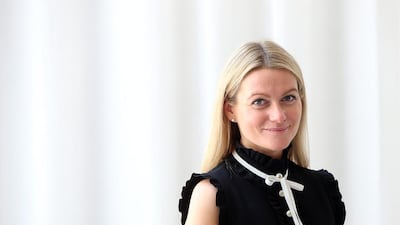Dubai’s creative economy is booming right now, says Vilma Jurkute, director of Alserkal Avenue, home to Dubai’s creative industries. And the art hub has certainly played its part. Spread across 500,000 square feet in Al Quoz, the architect-designed warehouses host numerous art galleries, art studios, a black box theatre and dining options, and will also soon be home to Dubai’s first art house cinema. A Lithuanian with a background in international business, Ms Jurkute worked in New York, Chicago and London before settling in Dubai in 2011. The 31-year-old, who joined Al Serkal Avenue five years ago as communications director, moving into her current position in 2014, is speaking at the Women In Leadership forum at Dubai International Financial Centre on how art can inspire social change.
How has Alserkal Avenue evolved since first opening in 2007?
Alserkal was founded by Abdelmonem bin Eisa Alserkal, an art enthusiast who wanted to create a thriving creative community in his home of Dubai. The Alserkal family are true art patrons – Abdelmonem’s father Eisa Alserkal has an incredible collection of calligraphy. The first gallery moved in in 2008, and since then we’re grown into a community of creatives that encompasses galleries, community spaces and creative spaces. We grew organically and I think that’s what creates that aura of authenticity for us – it took us almost a decade to be where we are today.
Last year, you inaugurated a massive extension. Tell us about that.
We had more and more galleries joining the community and reached the point where we had no space to accommodate the new creative businesses. The Alserkal family made an investment of Dh55 million to extend the neighbourhood by 76,200 square metres, to twice its former size. New galleries included the first international art spaces ever to open in the history of the Middle East, such as the Leila Heller gallery from New York and the Jean-Paul Najar Foundation (an art museum).
Has the addition of these international galleries been a game-changer for the local art scene?
Yes, it signifies the maturity of the art scene to have international galleries opening in this region for the first time. This is part of the synergy of what the UAE stands for in this region. In Sharjah, there’s the Sharjah Art Foundation and in Abu Dhabi you have the Louvre, Guggenheim and Zayed National Museums all opening soon. That’s probably why the international galleries are now opening in Alserkal Avenue, to get a foothold in this part of the world.
To what extent is the venture profit-driven?
It is a community initiative so the Alserkal family have always had a patron’s outlook. Profit was never the focus. It’s not a real estate project and now that it’s an arts organisation, as a self-sustainable initiative, a big part of our focus goes on supporting multiple profitable activities. We’re focused on supporting home-grown talent, in particular in emerging arts, and we initiated our home-grown programming almost two years ago. We’re opening an artist’s residency space in March 2017, which will be our first live-in and workspace for artists from this region and beyond. We want to foster artistic practice locally, to enable artists to create work here, and to be economically sustainable as artists. As a not-for-profit activity, it’s a way for the family to support the arts.
What would you like to see more of at Alserkal Avenue in the future?
We want families to be part of the scene, to be more community driven. When you go to an exhibition opening in Italy at 9pm, it’s full of babies. There’s no stigma in bringing your kids. Here in Dubai we need to work on this a little bit more to engage families. We actually have quite a few activities for families now.
Is the creative economy in Dubai experiencing rapid growth?
Absolutely. Back in 2012 when we announced our expansion, we received almost 700 submissions for the space, and we only had 50 spaces available. The home-grown talent that we’ve met with in the past few years has demonstrated the level spreading within this region. And we still have new spaces opening as part of our community. Apart from Alserkal, there are very few places in Dubai where artistic entrepreneurs can see their businesses have a home. In emerging economies, the role of arts and culture really shapes the cultural geography of the country, and the identity of the city itself. In the next five to ten years we foresee “cultural economics” playing a more significant role within the UAE and the region.
What have been your biggest success stories?
All of our home-grown galleries. When they started less than a decade ago, there was no art scene. They were the first galleries to open and now they’re the main pioneers for the art scene in this entire region – they’re the first ones to be accepted at international art fairs, and they participate as part of major biennials. Artists from around the Middle East have tended to gravitate towards Dubai in the last 10 years, since it’s become a commercial arts hub.
business@thenational.ae
Follow The National's Business section on Twitter

